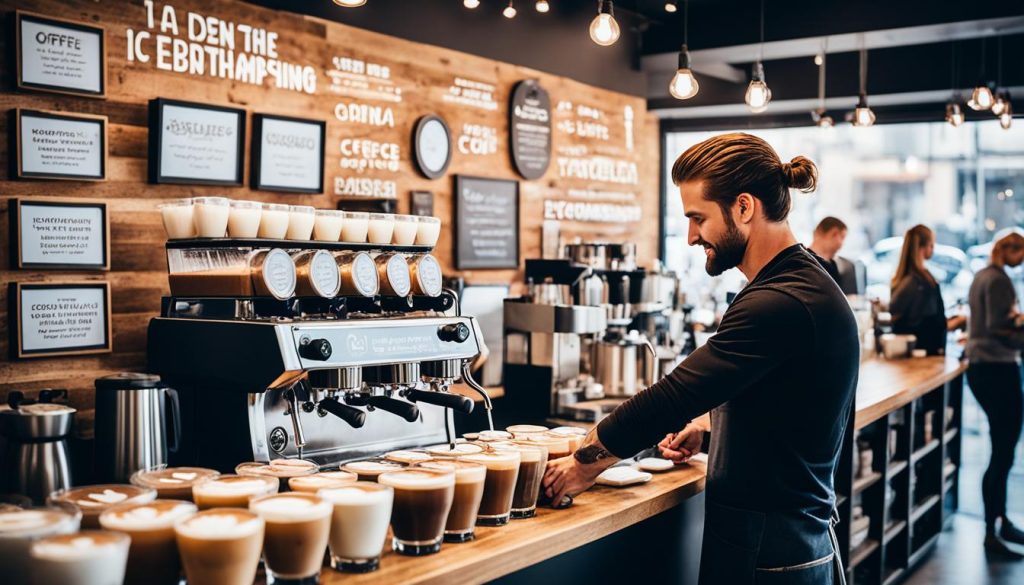The UK’s café culture is booming, even with economic ups and downs. With the industry expected to grow by 2024, starting a coffee cafe is looking like a bright idea. This growth is part of a larger trend, with cafes possibly adding half a million jobs by 2027.
Today’s customers want convenient, cost-effective cafes with a unique vibe and strong brand. Owners should use modern tech, like mobile card readers and easy website builders such as Wix, to stand out. Websites that grab attention can be built with help from places like Startups.co.uk.
Making a solid plan for your coffee business is key. This includes understanding the market, sorting out finances, building your brand, following rules, and marketing smartly. By focusing on these areas, you can make a mark in the bustling UK cafe scene.
Understanding the UK Coffee Shop Market
The UK coffee shop market is showing great strength. Independent cafes are leading the recovery and growth for 2024. Consumers now prefer special artisan coffee over big brands. This is because they value quality and care about sustainability.
Current Market Trends
Right now, the market is worth about £10.1 billion. Every day, 95 million cups of coffee are enjoyed. A big part of this is the high street café culture. Most Britons visit coffee shops weekly, creating a bustling scene. Despite big chains being popular, people love the special touch of independent cafes more.
Consumer Behaviour
Knowing what coffee shop customers like is key to success. They choose high-quality, ethical coffee. Many also look for a unique setting and special blends in cafes. This shows a big move towards supporting local spots and valuing real craftsmanship.
Future Opportunities
The future looks bright for UK coffee shops, with many chances to grow. Independent cafes can shine by offering unique experiences and top-notch coffee. There’s also room to be more eco-friendly, attracting those who care about the planet. With 2024 expected to bring recovery, it’s a great time for expansion and new coffee ventures.
Choosing the Right Location for Your Cafe
The success of a cafe hugely depends on its location. It’s critical to check several aspects to make sure a site works well for your cafe. These factors affect how many customers come in and how smoothly your cafe runs.
Factors to Consider
Choosing where to put your cafe means looking at different things. Think about how close it is to other helpful businesses, if it’s easy to get to, and if the area might grow soon. Knowing these things helps figure out the best spot for a cafe.
Foot Traffic and Demographics
It’s key to see how many people walk by a potential cafe spot. Places with lots of people walking by, like busy streets or near offices and stations, are great. Also, know who lives around there. What they like and how much they spend matters for your cafe.
Cost Implications
How much a location costs is crucial. Find a balance between a busy spot and what it costs in rent or buying. Look into lease details and hidden costs. Don’t forget the costs for fixing up the place, taxes, and utilities. This helps ensure your cafe’s location won’t break the bank later.
Start a Coffee Cafe Business: Key Steps
Starting a coffee cafe business in the UK needs several important steps. It’s vital for creating a successful business. Careful planning and doing each step well is key.
Defining Your USP
Finding what makes your cafe special is essential in a crowded market. You could offer unique coffee blends or organic choices. Or maybe create a special theme or use new service ideas. A good USP makes your café stand out and attracts customers.
Initial Planning and Research
Good research is the foundation of a strong plan. Learn what your future customers like and study your competitors. This helps you see what’s missing in the market and shape your cafe to fill those gaps. Doing your research well guides your business moves and builds a solid business model.
Getting the Necessary Permits
Getting the right permits ensures your cafe runs legally. You’ll need food safety certificates and to meet health rules. Plus, you have to register your business with local councils. Working with local authorities makes this process smoother. It helps you meet all legal requirements with ease.
Creating a Cafe Business Plan
Creating a strong cafe business plan is key for setting up for success. It should include a detailed executive summary, insights into the market, and competitor research. This ensures you have considered all important areas for a lasting business.
Executive Summary
Your cafe’s vision, mission, and goals are presented in the executive summary. It briefly explains your cafe’s concept, what makes it special, and your main aims. This gives potential investors and stakeholders a clear idea of where your cafe is headed.
Market Analysis
Market analysis involves looking into the coffee industry’s trends, your target customers, and what they like. It helps you see where you stand among competitors, the economy’s effect, and where opportunities lie. This knowledge is vital for putting your cafe in a strong market position.
Competitor Research
Understanding competitors highlights where you can stand out. By knowing their strengths and weaknesses, you can develop strategies to get ahead. This part covers an in-depth look at competitors’ products, prices, and how they interact with customers.
By weaving these sections into your plan, you create a well-rounded foundation. This foundation is essential for both running your cafe smoothly and making it financially strong.
Financial Planning and Budgeting
Effective financial planning and budgeting are key for a café’s success. They cover all expected costs, finding money sources, and figuring out profits to keep the business going. Let’s look at the important parts of financial plans for a new café.
Initial Startup Costs
Starting a budget means looking at early expenses. These are costs for getting a place, buying equipment, and employing people. Make a detailed budget for everything. This includes furniture, decorations, insurance, and marketing. Initial expenses can be high, but good budgeting helps avoid financial problems.
Sources of Funding
Finding good funding sources is crucial. Often, personal savings are the start, then bank loans and government help come into play. The Startup Loan Company offers loans with fixed interest rates. This help is vital for covering early costs and launching the café. Checking all funding options ensures you have the finances you need.
Profit Margins and Projections
Knowing and forecasting profits is vital for a café. Begin with financial forecasts, looking at daily sales, cost of goods, and ongoing expenses. Use these to work out expected profits. Regularly check your financial health by reviewing reports. As your café grows, reassess your profits, especially if you open more locations.
In summary, strategic financial plans are essential. This includes careful budgeting, finding various funding sources, and calculating profits accurately. Right financial forecasts for cafés help with long-term success and growth.
Designing Your Cafe’s Concept and Branding
Creating a unique cafe brand is key to getting noticed in the busy coffee scene. Your brand must show what your cafe is all about. It should make customers remember you.
Brand Identity
To build a strong cafe brand, start with a catchy logo and a color palette that shows your cafe’s vibe. These visuals must be the same everywhere you advertise. Think about what makes your cafe special. Make sure people can see this in your branding.
Interior Design Elements
The interior design is crucial for showing your cafe’s brand. The decoration should match your cafe’s theme and values, making it welcoming. Use comfy furniture, interesting lighting, and artwork. These elements help create a friendly atmosphere.
Creating an Aesthetic Appeal
Looks matter in cafes, not just for the space but for creating photogenic spots. A cafe that looks great in photos can improve your marketing. Pay attention to the little things. Like special table decor, attractive menus, and good food presentation. These details add to your cafe’s charm.
Selecting Equipment and Supplies
Getting the right stuff for your café is key to making everything run smoothly. It’s super important to pick out the best coffee cafe equipment and get your sourcing cafe supplies right. This makes sure your café can operate well and keep customers and staff happy.
Essential Coffee Equipment
The gear you use can really define how good your coffee is. Investing in top-notch coffee machines is a must. Items like commercial espresso machines, grinders, and blenders are the heart of making drinks. Brands such as La Marzocco and Nuova Simonelli are top choices because they last long and work great. Also, things like milk frothers and clean water systems are key for top-quality drinks.
Furniture and Decor
The choice of furniture selection and decor can really set the mood of your café. You want seats that are comfy, tables that look good, and decor that invites people in. Pick furniture that fits your café’s theme to make your brand stronger and keep customers coming back. Look at places like IKEA and Barker and Stonehouse for great design options.
Supplier Relationships
Great relationships with suppliers mean better quality and reliable deliveries. Focus on suppliers who offer top-notch coffee beans, tasty pastries, and everything else you need. Working with local and well-known suppliers could get you better prices and more reliable deliveries. Strong partnerships mean you’ll always have what you need when you need it. Companies like Matthew Algie and Taylors of Harrogate stand out in the UK for their quality service.
Developing Your Menu
Creating a great menu is key to a cafe’s success. It’s all about blending innovation, appeal, and practicality. It’s not just about tasty recipes but also about choosing ingredients wisely and managing costs.
Menu Design Tips
Your menu should mirror the café’s spirit and be easy to read. Featuring top dishes and drinks can draw customers to try them.
- Use high-quality images and descriptive names.
- Organise items logically – drinks, snacks, mains, desserts.
- Utilise a consistent colour palette that matches your café’s interior design.
Sourcing Quality Ingredients
Finding the right ingredients is vital for your menu. Work with suppliers who provide consistent and high-quality products.
Choosing local suppliers can ensure fresh ingredients and help your community.
Always check on your suppliers to keep ingredient quality high. Make sure to adjust for seasonal changes without losing menu integrity.
Balancing Cost and Quality
Creating a menu means balancing cost and quality. Figure out the cost of dishes to set fair prices that are also profitable.
Here are some cost-balancing tips:
- Use versatile ingredients to save money.
- Offer different portion sizes for different budgets.
- Adjust prices based on costs, trends, and feedback.
Using these tips can help you make a menu that’s both appealing and profitable. This way, you’ll attract and keep customers.
Understanding Regulatory Requirements
It’s crucial for your café’s success and reputation to follow legal rules closely. Following various laws protects your business and your customers from legal issues.
Licences and Permits
Getting the right licences and permits is key for your café. You might need food safety licences or alcohol permits, depending on what you offer. Talk to your local council to find out what your café needs.
Health and Safety Regulations
Keeping high health and safety standards in your café is essential. This means proper food storage, regular cleaning, and keeping equipment safe. It’s also vital to train your staff on health and safety rules to stay compliant.
Compliance with Local Laws
Your café must follow local laws, which could include rules on waste, noise, and making your space accessible. Regularly check and stay updated on these laws to keep your café out of trouble and avoid fines.
Hiring and Training Staff
The success of a café depends a lot on its staff. Finding the right people and training them well is key. It makes your café stand out.
Key Roles and Responsibilities
It’s important to clearly define roles like baristas and kitchen helpers. Each job has different skills needed and duties. This helps ensure staff know what to do and do it well.
Effective Training Programmes
Staff training in hospitality is crucial for quality service. It should include coffee making, food safety, and customer care. Staff need practical training and updates to stay sharp in a busy café.
Creating a Positive Work Environment
A good café atmosphere keeps staff happy and keeps them around. It’s important to communicate well, celebrate team achievements, and support each other. A happy team means happy customers, which is essential for success.
Setting Up Payment Systems and Technology
It’s vital to bring in modern payment tech to make cafes run smoother. This boosts how customers feel and how well the café operates. We’ll look at important tech like choosing a POS system, adding mobile pay, and using inventory tools to work better.
Choosing a POS System
When picking a POS system for your café, think about what you really need. A good POS does more than just handle sales. It should accept many payment types and offer detailed reports. Tools from Square and iZettle help keep things running smoothly, safe, and up to standard.
Mobile Payment Options
Nowadays, it’s key to offer mobile payment to keep up with techy customers. Apple Pay and Google Wallet let people pay fast without touching anything, making visits better. These options are a must-have for cafes today. They make buying things faster, safer, and easier. This keeps customers happy and coming back.
Inventory Management Tools
Keeping track of stock correctly is crucial for cafes to avoid too much waste. Good POS systems have inventory tools built in for seeing stock in real time. Vend gives tech that helps with reordering automatically, alerting for restocks, and making useful reports. Smart inventory control means always having what customers want without having too much, which makes the café run smoother.
Developing a Marketing Strategy
A successful marketing strategy for your coffee shop needs both online presence and local involvement. It’s a mix that reaches your target audience well. It also builds strong customer relationships.
Online Marketing Strategies
Online marketing is now vital for coffee shops. Using social media, like Instagram and Facebook, can boost your brand. Post interesting content regularly. Include tips on making coffee, behind-the-scenes looks, and happy customer stories.
SEO makes your café show up more in search results, bringing more people to your site. Have a nice website and maybe start a blog about coffee culture. It’s a great way to market your business.
Local Advertising
Local ads are still key, even with digital options. Work with nearby shops for special deals. Hand out leaflets at local spots and offer refreshments at events. This boosts your shop’s name.
Give discounts to local workers and students. It draws in regulars.
Creating a Loyalty Programme
Loyalty programmes keep customers coming back. Use a card system or a mobile app to track buys and give rewards. Free drinks or discounts are good rewards.
This not only brings customers back. It also creates a community feel. Plus, it helps you learn what your customers like, so you can serve them better.
Building Customer Relationships
In the UK café market, strong customer relationships are key to success. A welcoming setting draws both new and return visitors. It’s about more than coffee; it’s about making a place where people feel appreciated and comfy.
Creating a Welcoming Atmosphere
A café’s atmosphere should mix warmth with professionalism. Things like snug seating, soft lighting, and stylish décor make for a welcoming feel. Adding British touches, such as old-fashioned tea sets or cozy bunting, makes customers feel relaxed and keen to come back. A nice café vibe boosts customer ties by giving a pleasant, unforgettable visit.
Engaging with Regular Customers
Regulars are vital to any café. Getting to know them adds a personal touch, making them feel valued and seen. Recall their favourite drinks, their names, and chat a bit. This personal approach builds loyalty and a sense of community, keeping a firm customer base. Personal connections can lead to recommendations and good reviews.
Encouraging Customer Feedback
Asking for customer opinions is essential for growth. Urge them to give feedback, in person or online via social media or review websites. Listening to criticism helps identify what to improve, while praise highlights what works. Actively looking for and acting on feedback shows a dedication to great service and happiness. This approach strengthens customer bonds and encourages lasting loyalty.










